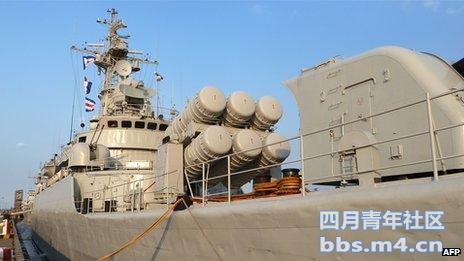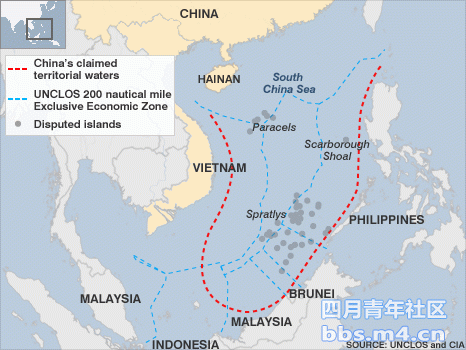|
|
【中文标题】南海紧张局面引中国邻邦恐慌
【原文标题】South China Sea tensions rattle China's neighbours
【登载媒体】BBC
【来源地址】http://www.bbc.co.uk/news/world-asia-pacific-15578083
【译 者】 WilliamRUC
【翻译方式】 人工
【声 明】 欢迎转载,请务必注明译者和出处 bbs.m4.cn。
【译 文】

China's growing naval power has encouraged it to be more assertive
中国不断发展的海军力量使其更加张扬
Chinese leaders like to talk about their country's "peaceful rise" - and Europe's financial traumas are giving Beijing plenty of scope to assume the role of a benign new force on the world stage.
President Hu Jintao has presented himself as a "friend in need" during encounters with European supplicants while stopping short, for now, of committing China to a specific contribution.
But China has been showing a very different face to countries closer to home in an increasingly tense confrontation over rival claims to the resource-rich waters of the South China Sea.
It is a region where the peaceful nature of China's rise is starting to be questioned as it pushes a long-standing maritime claim that stretches deep into South East Asia.
"China is becoming much more confident in the region and there are signs it is becoming giddy with success. It has become much more influential much more quickly than it expected," says Dr Kerry Brown of the Asia Programme at Chatham House in London.
中国的领导人热衷谈论国家的“和平崛起”,欧洲金融危机又给了中国作为一支新的力量走上世界舞台的机会。
胡锦涛主席在欧洲求助者面前表现了“患难朋友”的形象,后者要求中国承诺具体的帮助。
但是中国在周边区域则露出了一张不同的脸,在资源丰富的南海领域提出的领土主张导致了逐渐加深的紧张局面。
这里使得中国和平崛起的本质受人质疑,长期以来它坚持深入东南亚的海域是本国领海。
“中国在这里地区变得越来越有信心,看起来被成功冲昏了头脑。它以出乎意料的速度产生了更大的影响力”,伦敦查塔姆研究所亚洲项目的凯瑞•布朗说。
Vietnam and the Philippines in recent months have seen the snarl of a resurgent regional power that is fast losing patience with the gripes of smaller neighbours over maritime borders.
"If these countries do not want to change their ways with China, they will need to prepare for the sound of cannons. It may be the only way for the dispute in the sea to be resolved," said the state run newspaper, the Global Times, in a recent editorial.
Chinese officials have been more restrained in their comments, but foreign ministry spokesmen have issued a series of warnings about what they see as encroachments into Chinese waters.
Beijing says it does want a peaceful solution. But Vietnam and the Philippines say Chinese ships have stepped up harassment of vessels involved in oil exploration and fishing.
"The growth of Chinese military spending is beginning to translate into hard power," says John Hemmings, an analyst at the Royal United Services Institute.
最近几个月越南和菲律宾见证了中国复苏的地区力量,后者迅速失去对待海上小邻国的耐心。
“如果海上争端国不愿改变目前的对华行为方式,那么它们就应对东亚的海面上响起一些炮声有思想准备。这或许是东亚海上实现真正平静之前不得不经历的混乱”,国家管理的《环球时报》在近日的社论中提出。
中国官方在他们的评论中更加克制,不过外交部发言人对侵犯中国领海的行为提出了一系列警告。
北京表示它真诚地希望和平解决。但是越南和菲律宾称中国加强了对油气开采和渔业捕捞船的骚扰。
“中国军方不断增长的军费正在转化为硬实力”,皇家联合服务研究所的约翰•海明斯说。

China's stance on the South China Sea is making neighbours like Vietnam worried
中国在南海问题上的立场让越南等邻邦担忧
"This is the first major sign that a more confident Chinese grand strategy is emerging. It is in the South China Sea that there is a real risk of discord between the US and China."
The disputes are about oil and gas reserves, lucrative fisheries and sea lanes that are crucial to the giant industrial economies of East Asia. But they also point to a strategic contest with the United States, which has been the dominant military power in the western Pacific since 1945.
"China has a containment mindset," says Kerry Brown. "It thought that the United States was ceding influence but it sees the US is still active all around its borders from Afghanistan to Japan."
In the latest incident, Beijing responded sharply to an announcement by the American company, Exxon Mobil, of a new oil find off the coast of central Vietnam.
It appears to be well within Vietnam's 200-nautical-mile exclusive economic zone. But China issued a now familiar warning that it has indisputable sovereignty to large parts of the sea.
“这是更有自信的中国庞大规划浮现的迹象。在南海区域冒着中美不和谐的真实风险。”
争端涉及油气储备、利润丰厚的渔业及对东亚庞大经济体至关重要的航线。但是它也指向对美国的战略对抗,自1945年来美国在西太平洋成为主导性军事力量。
“中国有一种遏制(美国)的思维定势”,凯瑞•布朗说,“它认为美国影响正在下降,但是它观察到美国依然围绕中国从阿富汗到日本的边界积极活动。”在最近的事件中,中国对美国公司埃克森•美孚在越南中部海岸发现油田的宣告给予了尖锐回应。
该油田明显在越南200海里经济专属区内。但是中国警告说其拥有对南海大部分地区无可争辩的主权。

The South China sea dispute raises intense passions in Vietnam
南海争端加剧越南的紧张情绪
"We hope foreign companies do not get involved in disputed waters for oil and gas exploration and development," said a foreign ministry spokesman.
China's maritime claim is ill-defined but it resembles a giant U shape extending for more than 1,000km (621 miles) off its southern coast and reaching into what Vietnam, the Philippines, Malaysia and Brunei see as their own waters.
It recently warned Indian firms to stay away after they signed exploration agreements with Vietnam. India has nettled its giant neighbour by developing a "strategic partnership" with Vietnam - in China's view an intrusion into its own backyard.
Vietnam appears most vulnerable. Its leaders have been stung into an unaccustomed flurry of foreign visits as they seek help from the region and beyond.
“我们希望外国公司不要进入争议海域进行油气勘探和采伐”,外交部一位发言人称。
中国的领海主张并不明确,但是类似于从大陆南部海岸延伸1000公里的巨大U型,覆盖了越南、菲律宾、马来西亚和文莱认为的各自领海。
它最近警告与越南签署勘探协议的印度公司远离该海域。印度因为与越南发展了“战略性伙伴关系”热闹了这个大邻国——在中国眼中不啻是对其后院的侵犯。
越南看上去最脆弱,它的领导人为寻求国内外支持四处访问。

"Vietnam feels out on a limb," says John Hemmings. "It understands that a naval conflict with China could be over very quickly. The Vietnamese are much more exposed than they first thought."
Some believe it will be very hard for China to back down.
"China is driven by a nationalistic agenda, It won't find it easy to make compromises over what are seen as crucial resources, such as energy in the South China Sea," says Kerry Brown.
Whatever its intention, China has succeeded in frightening traditional US allies such as Japan and South Korea firmly back into the American fold, along with a host of new suitors.
US officials have tried to underline their commitment to the region, at a time when some allies are questioning Washington's staying power.
“越南感到无助”,约翰•海明斯说,“它懂得和中国的海上冲突会很快以失败告终。越南人更容易暴露他们的第一想法。”
一些人认为中国不太可能再退步。
“中国被民族主义情绪驱使,中国要在类似南海的能源等核心利益上作出妥协并不容易”,凯瑞•布朗说。
无论它打算如何,中国成功地阻止了美国传统盟友韩国与日本的公司介入,使其与一些新的追求着回到美国的怀抱。
It will be years before China's growing military power can challenge the overwhelming naval might of the United States, backed as it is by a network of military bases across Asia.
But China's development of new land based missiles designed to target aircraft carriers is a sign of its fast-growing capabilities.
"I want to make very clear that the United States is going to remain a presence in the Pacific for a long time," said the defence secretary, Leon Panetta, on an Asian visit late last month "If anything, we're going to strengthen our presence in the Pacific."
President Barack Obama is expected to underline this commitment when he hosts Asian leaders at the APEC conference in Hawaii this month.
China may have found in the South China Sea dispute an arena to test US resolve and attempt to nudge it out of the region.
If Washington fails to live up to its rhetoric, China's smaller neighbours will have little choice but to accept the new realities of what the US itself is calling the "Pacific Century"
中国发展的军事力量能够挑战美国强大的海军还需要许多年,后者在亚洲各地广布军事基地。
但是中国新式陆基导弹的开发并指向航母是其能力快速增长的标志。
“我必须阐明美国将在太平洋海域保持很长时间的军事存在”,美国国防部长利昂•帕内塔在上个月的亚洲之旅中说,“如果有必要,我们还会加强在亚洲的存在。”
美国总统奥巴马预计在本月召开的亚太经合组织领导人会议上强调这一承诺。
中国也许会发现南海争端可以试探美国能否在这一地区削弱影响。
如果美国没能坚持它的措辞,那么中国的小邻居们不得不接受美国描述的“太平洋世纪”这一事实。
|
评分
-
1
查看全部评分
-
|